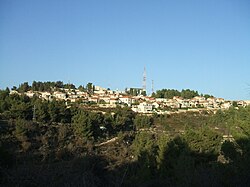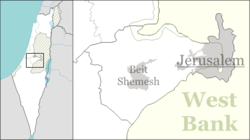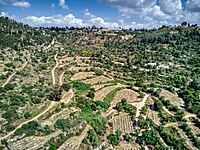Ora, Israel
Ora אוֹרָה | |
|---|---|
 Ora in 2007 | |
| Coordinates: 31°45′15″N 35°9′13″E / 31.75417°N 35.15361°E | |
| Country | Israel |
| District | Jerusalem |
| Council | Mateh Yehuda |
| Affiliation | Moshavim Movement |
| Founded | 1950 |
| Founded by | Yemenite Jews |
| Population (2022)[1] | 1,295 |
Ora (Hebrew: אוֹרָה, lit. 'Radiance') is a moshav in central Israel. Located southwest of Jerusalem, it falls under the jurisdiction of Mateh Yehuda Regional Council. In 2022 it had a population of 1,295.[1]
History
The village was established in 1950 by Jews from Yemen on land that had belonged to the depopulated Palestinian village of al-Jura.[2] The name "Ora" was taken from the Book of Esther 8:16: "For the Jews it was (a time of) radiance."[3] The residents initially lived in tents and by 1954 only thirteen families remained.[4] In 1953 Percy Newman, a British Jewish industrialist, donated money to the Jewish National Fund for the purchase of 3,000 dunams for the moshav.[4] Several North African Jews later joined the moshav.[4]
Residents were given tracts of land allocated for poultry farming and continued to live in tents, without running water or electricity, until 1957. Before the establishment of Kiryat HaYovel, the closest neighborhood was Beit VeGan, which was reached on foot or by donkey.[5]
In the 1990s, after the wave of Russian immigration to Israel, the moshav increased egg production from 300 million to 500 million eggs a year.[5]
Gallery
- The view from Ora to Hadassah Medical Center. The al-Jura village was mainly on the right spur of the valley
- A ruined house, one of the last remains of al-Jura
- Ora and below of it the Ein Sarig valley
- Ein Sarig from above
References
- ^ a b "Regional Statistics". Israel Central Bureau of Statistics. Retrieved 21 March 2024.
- ^ Khalidi, Walid (1992). All That Remains:The Palestinian Villages Occupied and Depopulated by Israel in 1948. Washington D.C.: Institute for Palestine Studies. p. 298. ISBN 0-88728-224-5.
- ^ Vilnai, Ze'ev (1969). "Ora (I)". Ariel Encyclopedia. Vol. 1. Tel Aviv, Israel: Am Oved. p. 86.; Hanna Bitan (1999) 1948-1998: Fifty Years of 'Hityashvut': Atlas of Names of Settlements in Israel, Jerusalem, Carta, p. 3, ISBN 965-220-423-4
- ^ a b c "Remembering Percy Newman". The Jerusalem Post. 26 September 2011. Retrieved 27 May 2019.
- ^ a b Hasson, Nir (10 January 2012). "Art Galleries in Chicken Coops? No More". Haaretz. Retrieved 27 May 2019.





